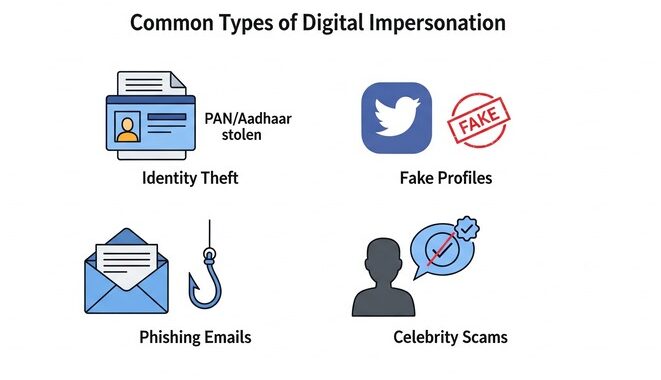
By Pragathi E, Researcher
Imagine someone impersonating you online, chatting with your friends, soliciting money, or scamming people like you – with the growing use of AI tools, this is becoming more and more likely. These “digital doubles” could have real effects on your finances, reputation, and peace of mind.
Impersonation at its core is digital fraud and therefore boils down to criminal actors putting on a digital mask, pretending to be you, your friend, or trusted brands to exploit trust for monetary gain. Impersonation has become the darling of the cybercriminal given our vastly online lives.

1. Identity Theft for Financial Fraud
Scammers can impersonate you completely if they steal your Aadhaar, Pan and bank account credentials. Actor Aftab Shivdasani lost ₹1.5 lakh in October 2023, when he clicked on a link in a fake bank KYC update. Even tech-savvy DMK MP Dayanidhi Maran lost nearly ₹1 lakh as funds were transferred from his Axis Bank account, minus an OTP, which is a basic security measure.
2. Shoaled Social Media Profile
Criminals create fake social media accounts adopting your name and your likeness, they then friend your real contacts to ask for money or spread harmful content In January 2025, influencer Ankush Bahuguna was involved in a terrifying event called “digital arrest” scam, where he was subjected to impersonated police who kept him on video calls for more than 40 hours and demanded money.
Another examples would be in 2024, when scammers created a fake “SBI Helpdesk,” and when they responded to complaints from victims about delayed payments, they instructed the victim to move the conversations from the public complaint to a private message, where they stole the OTPs and banking details.
3. Business Email Compromise (BEC)
Criminals impersonate executives or vendors of a company into authorizing money that they steal. For instance, Facebook and Google lost over $121 million because the fraudulent BEC was successful against a Lithuanian scammer impersonating an Asian supplier with invoices that simply looked legitimate.
4. Celebrity and brand impersonation
There are bogus ads with deep fake endorsements from celebrities like Amitabh Bachchan and Ranveer Singh that redirect users to other scam sites. The deep fake video of Rashmika Mandana that went viral in November 2023 shows how effectively celebrities can be impersonated.

For Individuals: Victims that have been impacted by identity theft usually experience identity theft, bankrupt bank accounts, and no peace of mind, and rebuilding that trust can take years. For Businesses: Financial losses are staggering, reputations are destroyed, and customer trust is broken that can cause a business to have a very real threat to their survival.
For Society: As AI advancements amass that are increasingly convincing when it comes to deepfakes, loss confidence in digital communication drives misinformation omnipresent, and influence our democratic processes. AI is Advancing Scams AI has changed the landscape of impersonation so efficiently that an AI generated fake can now be unidentifiable.
In 2025 a Hong Kong based company lost $18.5 million (₹150+ crores) when scammers used AI deepfake voice and video to impersonate a senior executive to persuade employees to approve a cryptocurrency transfer through WhatsApp and video calls. Amazon recently sounded an alarm about “incredibly realistic” fake calls, texts and emails powered by AI targeting Prime users to access their most sensitive information through scams. Protection Strategies
Digital impersonation is a major issue and it’s only getting worse. The July 2020 Twitter Bitcoin hack was a huge media story, where Twitter accounts of individuals including Elon Musk, Apple and Barack Obama were taken over to use their accounts for fake cryptocurrency giveaways. This involved digital impersonation and demonstrated how no platform, no social media or website is safe.
As deepfakes become easier to make with AI, staying safe seems to be more of a constant vigilance by people, companies and tech platforms. In a world where your face, name and voice can be stolen, the best protection is awareness and security on their behalf to avoid becoming the next victim of digital impersonation.